Chris Baty's Blog, page 231
August 30, 2012
Book Thoughts: Relatable, Action-Packed Writing Advice
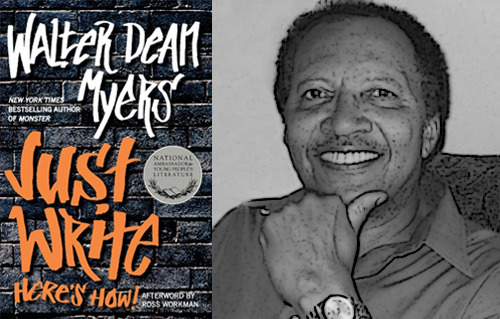
“You can find inspiration everywhere. The trick is to keep your eyes open.” – Just Write: Here’s How!
I am a glutton for writing advice, and the most common tip I receive is “write what you know.” Personally, I find that a bit vague; if I only wrote about what I truly know of the banality of daily life, I’d have a pretty boring book on my hands.
Few advice-givers take the difficulty of crafting action into account, and this might be my favorite thing about Walter Dean Myers’ book, Just Write: Here’s How! Yes, he guides his readers towards writing about topics that are familiar to them (with good reason!), but he also gives specific and detailed descriptions of how to turn that boring high school fitness test into an emotional turning point for the main character.
Myers starts us off with a short and descriptive chapter on his evolution into a writer. However, rather than reading like a simple autobiography, this chapter offers a personal glimpse into his interests as a person and, correspondingly, as an author. Seeing how he aligns his life experience with his writing is a great tool for learning how to apply my own seemingly random life experiences with my fiction.
You see, I started reading this book in the midst of facilitating a weeklong personal-writing workshop for Oakland-based high school seniors applying to college. Going into it, I thought it would only interfere with my Camp novel, and I was resigned to failing in Week 2. But with a little thought and inspiration from both the kids I was working with, and Myers’ book, I changed my original, semi-boring idea into a more emotionally engaging story about a college freshman.
It may not be the literary masterpiece I was hoping for, but it’s something I and many others have experienced. It’s also something other people might actually be interested in reading, and I hope to turn it into something that the college freshman I was with would appreciate.
Myers mentions how he is always “keeping [his] mind open to ways to make [the] scene breakdown richer” when he is out and about in the world: be it shopping, driving, or just going for a walk around the neighborhood, he makes the fantastic point that incorporating multiple actions into one scene creates a depth and interest that just doesn’t exist with plain dialogue. While this usually sounds easier than it actually is, Myers lays it out in an almost mathematical fashion.
Throughout the book, he includes his actual writing notes and outlines demonstrating his process of expanding individual plot points into scenes that include dialogue, description, and energy. For a novice like myself, this proved invaluable. I know how to craft an outline for an academic paper, but I quickly learned that I needed a different technique for long fiction, and I used a couple of Myers’ outlines to make some short ones for my own novel.
I could go on about the 15 short writing tips in the back of the book (ten written by Myers himself, five written by his teen writing partner, Ross Workman), or the chapter-by-chapter breakdown of crafting a plot outline, but I’ll let you discover those for yourself!
— Shelby
August 28, 2012
7 Cool Facts with Chris Baty: the Alaska Edition

Grant and Chris A. have provided deeply poetic accounts of our recent trip to rural Alaska. In documenting the creative-writing workshops we held, the stories we heard, and all the inspiring people we met, they sadly left out one very important thing: random Alaska trivia.
I’m here to fill that gap with seven cool facts we learned in southeastern Alaska:
Anyone who lives in Alaska for two years gets an annual payment of about $1000 from the state. It comes from something called the Permanent Fund, and for those born in our great northern state, the money begins accruing when you’re a toddler.
The phrase “low man on the totem pole” is based on a misunderstanding of totem pole power dynamics. Some totem poles feature the mightiest tribal families on the bottom. And ultimately, if you’re on the totem pole at all, you’re doing something right.
Not all of Alaska has the tundra-tastic winters we associate with the state. Prince of Wales Island, for instance, is a rain forest and only gets two weeks of snow per year. (Instead of snow, the residents are blessed with 50 mph gales of stinging rain.)
Prince of Wales Island is the fourth largest island in the United States, and it only has two stoplights. Both will be removed shortly.
Even experienced fishermen get seasick from time to time. Dramamine is viewed skeptically, and those in the know swear by a product called Bonine when they’re feeling queasy. (On our one fishing trip, Grant, Chris and I had a chance to acquaint ourselves with the delights of Bonine, and it worked like a charm.)
During the summer, fishing crews stay out at sea for days at a time. It’s intense work, but several of the fisherfolk we met also see it as a great opportunity to get caught up on their reading. One gillnetter we ran into at a bar was spending the summer on his boat plowing through all of the Russian classics. He introduced himself to Chris A. by asking about Chris’ favorite character from The Brothers Karamozov.
As Grant mentioned, Alaskan fishermen are tough as nails and stare down death on a daily basis. The only thing they fear? Bananas. Which, according to angling lore, drive the fish away.
Alaskans! What other cool bits of trivia am I forgetting here?
— Chris
Aerial photo of Craig, Alaska by Chris Baty. Who got to ride in the cockpit.
August 25, 2012
The OLL-iverse: Starlog 10
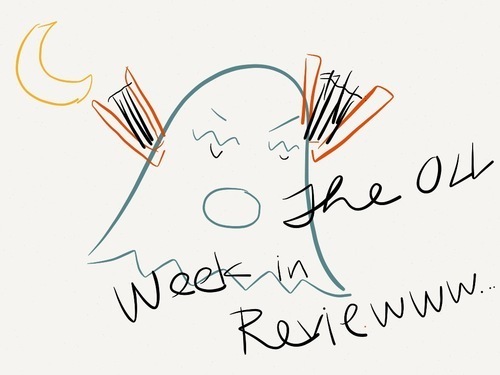
We are heading into our final weekend of Camp NaNoWriMo August 2012: the Inner-Editor-Killer, Plot-and-Character-Thriller Edition, also more manageably known as “CNATIEKPACTE”. Acronyms make things so much easier, always!
This is when we buckle down and turn into a Boot Camp. So put those dukes up, strap on those breastplates, and let’s get kick novel behind. You know the parameters of your mission, read on for updates, context, and color from your members of HQ on the ground.
Today’s recap is brought to you by Tim, who busts ghosts, and cries salty tears over his keyboard during moments of writer’s block.
Camp NaNoWriMo:
Did you participate in June’s Camp Session (also known as June Camp NaNoWriMo 2012: Hoplites, Amazons, and Zulu Warriors of the Noveling Tribes, a Jam Session)? We’d love to get your thoughts in our survey!
FOLKS. Winning begins tomorrow! Lindsey gives you some handy tips, tricks, and things to watch out for on your way to the validation gong.
I told a scary story about the Camp Spectre, and its efforts to halt the telling of your own tale. Write that ghost-busting novel, Campers!
The bigwigs over at Intel, W, and Vice are matching every dollar you donate to Camp up to $10,000 through the end of August. Holy smokes, this may finally be the year we get that noveling holodeck.
Facebook & Twitter:
Punctuation marks have a personality, agreed? Today’s writing prompt asks you what goes down when ! meets ? in a dark alley…a romantic rendezvous? A mugging?
@NaNoWriMo incites more punctuation mark factionalism by asking which is the best. Not your favorite, the best. Clearly, Sarah hopes to dance while watching the fragile Semicolon-Emdash Peace of 2003 burn.
NaNoWriMo
THE COUNTDOWN CONTINUES. 68 Days Until NaNoWriMo. Time to wiggle out those jitters, and start the training…
In the Office & Elsewhere:
As we speak, Grant, Chris Angotti, and Chris Baty are on their way back from Alaska. We in the office are expecting them to come bearing gifts. Many Alaskan gifts.
Figment launched a series that offers an author’s commentary on their novel. First up? Jessica Warman tells you about writing Beautiful Lies.
Let’s be real, everyone. Between Cobie Smulders in the Avengers bloopers, and Taran Killam in that Robyn video a while back, who could beat them out for best couple ever? Amy Poehler and Will Arnett? …Yes. Yeah, Amy and Will beat them, but just by a smidge.
August 24, 2012
Postcard from Alaska: A Big Land Full of Big Stories
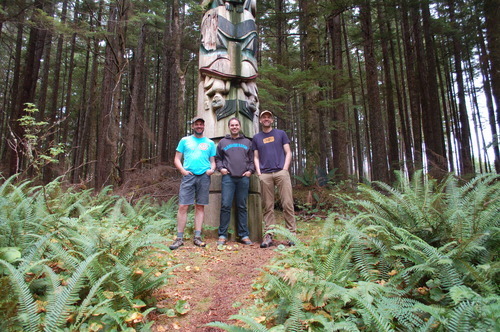
Expanses tend to fill up with stories. That’s just one of the realizations our NaNoWriMo team of rollicking writing evangelists has made this week while preaching novel-writing in small-town Alaskan libraries.
It all started when Chris Baty co-piloted our floatplane to a splash landing in the bay outside of Craig, Alaska. Or so goes the tale as he tells it. He actually just sat in the copilot’s seat on the flight up, but such literal details don’t matter when creating stories that speak to higher truths.
Since our splashdown, I’ve heard stories about people who live in the bush and mush a team of dogs for days to get provisions, about moose that eat cabbage out of people’s sinks (and lick their cars for the salt), and about fishermen who forbid bananas aboard their boats because they ward off fish.
As Chris A. mentioned in his earlier post, Amy Marshall, an accomplished Wrimo and a librarian in Craig, Alaska, raised the funds to bring Chris Baty, Chris Angotti, and me here to convince people to write their tales. A basic NaNoWriMo precept is that everyone is a storyteller, and that’s proven true. Alaska might be sparsely populated, but words gush like the streams here, in part because people’s stories connect them in ways that the geography doesn’t.
Days are mostly dark and rainy in the winter months, so people have the time to ruminate on the story only they can tell. Stories abound, even if they’re not written down. We learned that on some totem poles, when figures’ tongues touch others, it means that a transformative story has been conveyed to another.
I’ve even heard of a new genre called “elf chick lit”—named by Wrimo Nikki Hyson, of Wasilla, Alaska. Nikki won the Craig, Alaska Pitchapalooza this week amidst stiff competition from many Alaskan scribes. Congrats to Nikki!
I travel to discover such stories. I love seeing proverbial elves dashing through the hills and dales of new landscapes, and in the midst of new sights and sounds and scents, different storylines flow through me.
I saw a pearly white jellyfish billowing through the water like an angel. I saw a whale grunt and spout and flip up its tail in friendly salutation. I saw a piece of driftwood bleached so smooth and white by the salt water it seemed as if it was covered in skin.
I’ve also seen a lot of fascinating mustaches. As you might guess, fishermen in these parts can be a grizzled lot, so I’ve wondered how to describe their facial hair. Some men have beavery ‘staches while others sport stiff iron brushes. A writer’s description toolbox is never full, and I know an Alaskan fisherman will enter a future tale—maybe even this year’s NaNoWriMo novel.
We haven’t seen Sasquatch yet. But we’ve heard about him. And if we see him, we plan to give him a NaNoWriMo sticker. It’s time we hear his story.
— Grant
August 22, 2012
Finding Stories in Alaska
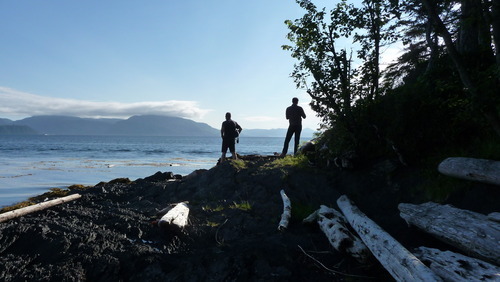
Over the past five days in Alaska, we have seen black bears, bald eagles, otters, and humpback whales.
More importantly, Chris Baty, Grant Faulkner, and I have seen and met many Alaskans who are very excited about NaNoWriMo. We’re here on a mission to get people to share their stories, and we can hardly believe just how many there are up here.
When Amy Marshall, the librarian from Craig, AK (and the brilliant grantwriter responsible for our trip), first told us about the idea for this journey, we didn’t quite know what we were in for. “Talk with the locals about NaNoWriMo and writing” was pretty much the gist. Craig had just become part of the Alaska OWL video conference network, and we would be one of the first to utilize it, bringing our unique blend of inspiration, encouragement, and moose jokes.
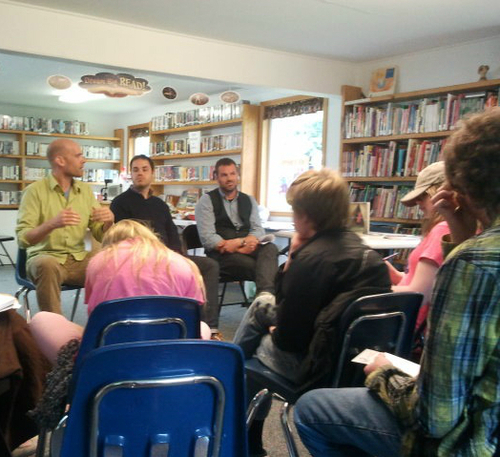
During our workshops, we’ve met many wonderful writers—both in person and at other small libraries via video conferencing—with stories to tell. From the town librarian in Hollis (population: 80) who leads a children’s book project, to the unstoppably funny mother-and-teen-daughters writing team in Craig, to the longtime wood carver who had a vision she’d be published someday, these are incredible people we never would have met otherwise. And a few are even Wrimos already; they’re sharing their books as part of the Book Doctors’ Pitchapalooza events, which have been going on concurrently.
Aside from seasonal fishermen, people from “the Lower 48” (and yes, I will keep saying that when I return) rarely come to this part of Alaska. Because of this, we’ve been treated incredibly well by our hosts and new friends. Who welcomes random creative-writing nonprofit folks to the town salmon feast? And takes them on a fantastic bear-sighting trip? And brings Chris Baty’s beloved Haribo gummy bears to an impromptu barbecue? Alaskans, that’s who.
We are so thankful for our time so far, and can’t wait to get acquainted with even more novelists (both would-be and current), and their stories. Where are you all writing from?
— Chris
August 20, 2012
Writing in the Borderlands

Writers are some of the most curious people I know; you’d have to be to feed the drive to fashion worlds and stitch out entire lives. Curiosity forces you into the borderlands of your experience and imagination. And the borderlands are where you make your discoveries. Where you meet someone who wants something you’d never think to want, or see a sight that should be counted as the least-talked-about-natural-wonder-of-the-world. Where you come across a piece of writing that makes you think, “Of course, humans invented writing. We had to.”
When I’m on a roll, it can be hard to think about anything else but my novel. Honestly, some of the time, that does translate into choosing to stay in when everyone goes out. “Beach camping? That’s cool, man. Save me a s’more. Dig a moat around your tent to keep the sand rats away.” (That last is actual advice given by a guide in Costa Rica. Truly terrible.)
But the more I talk to writers, the more I realize that we often end up exploring so much more when we’re writing. Not that I’m base-jumping, or hopping on a seaplane out to Rapa Nui when I’ve got a novel brewing. But I do pursue conversations I wouldn’t normally think to have with old college buddies who are now opera singers, or read books and articles about a staged assassination in Guatemala, or finally get out kayaking in the bay to figure out the exact sharpness of the gasp in your chest when you slap through a spray of water (that last one sounds cooler than it was. Really, my most vivid memory is the discomfort of constant wet butt. Tasteful. Color!).
As I sat down to write my novel this weekend, there was a moment on Saturday night when I was pretty dissatisfied with what I’d written so far. I forgot what had drawn me to this story in the first place. So I went to my default, always-productive answer to writer’s block: I decided to tool around on the internet, and came across this post on Reddit.
The first comment in that thread was from someone who had served with the poster’s brother in Afghanistan. He reminisced about coming up in the ranks together, about the poster’s brother’s initial struggle with earning the respect of his men, and how that made him a better leader. He posted pictures, and said what he’d want to say if and when he ever made it out to the grave.
The internet is big, and the world is cold, but know that somehow many of us are more connected than we realize. For me, your brother was also my brother, and not a day goes by that I don’t think about him.
There is great writing everywhere. People can be so kind. We live in an inspiring world.
What’s inspiring you?
August 18, 2012
The OLL-iverse: Starlog 9
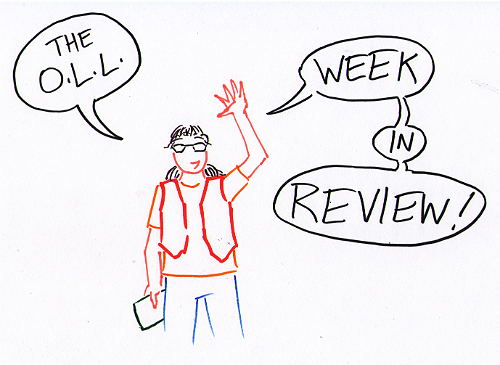
By the time you read these words, I will be gone. Alas, my tenure at the OLL has come to a close… for now. I’m off to the seasonal lands of the east, to icy winter and humid summer, where I will run LARPs and then go back to college for one final year.
This summer has been one of the best of my life, and the OLL has been central in that. I’m very sad to be leaving them behind, but rest assured, like the Governator who shares most of my last name… I’ll be back.
Oh, right, you probably want to know what happened this week. This week’s recap is brought to you, for the last time this summer, by Ben Schwartz (Note from Tim: Who will be dearly missed!).
Camp NaNoWriMo:
Lindsey, head counselor, and feared enemy of baby carrots everywhere, has a scientist friend who has officially declared your imagination boundless.
Chris, YWP director and newlywed, urges you to keep rowing through the choppy waves of Lake Plot.
StayClassy fundraisers! We’ve been Fund-raiders of the Ark, searched the Temple of Woon (Mr. Ian), and are now deep in the Noveling Crusade. If you fundraise with us this week, we’re offering last year’s limited edition bumper sticker!
We’ve been offered a matching donation by the folks over at Intel, W, and Vice: every dollar you donate to Camp will be matched up to $10,000! You know what that means? Sloppy Joe Night is every night in the Camp cafeteria!
Facebook & Twitter:
This week’s writing prompt? Celebrate stationery through poetry. I will be composing a rap about pumping my mechanical pencil full of lead.
@CampNaNoWriMo is taking an informal poll of your status. Be not ashamed! Brag to your heart’s content. I will be crowing about my 1,354 words. That is still an accomplishment.
@NaNoWriMo is taking bets on who between Chris A., Grant, and special guest Chris Baty will be eaten by a bear during their trip to Alaska to workshop NaNoWriMo. Here is a ‘before’ picture. Stand by for the potentially gruesome ‘after’.
NaNoWriMo
There are only 76 days until November, and I have about 115 days worth of brainstorming my novel and bemoaning the inexorable approach of November while secretly being over-the-top excited to do. WHAT DO I DO.
In the Office & Elsewhere:
Folks! The warehouse move is finally complete, and we are shipping again. Look for a coupon code to thank you for your patience, and some special goodies in your packages. Unicorns for everyone!
As we mentioned, Chris A., Grant, and Mr. Baty himself are out in Craig, Alaska taking in the natural beauty, and incredible work of librarians like Amy Marshall through the Alaska OWL Project.
Thanks again for an incredible summer, everyone. I’ll see you in November!
August 16, 2012
Lessons From the LARP Side, Part 4/4: Plot
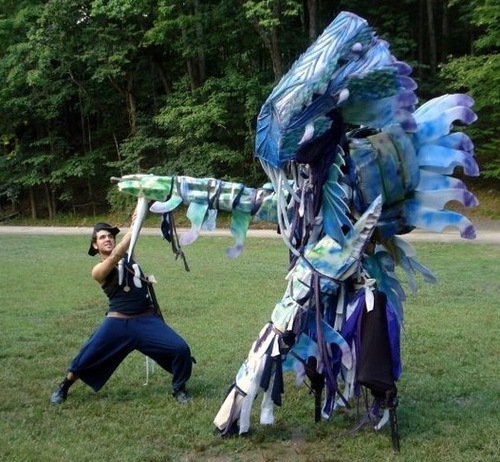
Ready for one last adventure? Previously, we talked about gamewriting (and writing in general!) basics, creating settings, and writing characters. This week we are tackling our final topic: the actual plot! Now, some of you are pantsers, and some of you are planners, but everyone needs a plot sooner or later. The middle of Camp NaNoWriMo’s August session seems like as good a time as any to figure that out!
For a Live Action RolePlay, the writer constructs what we call a Flow. It’s sort of a skeleton of what the writer wants to happen, consisting of major events: the Dragon King is assassinated! the spaceship’s engines break! These generally serve as catalysts for the players to react to.
But of course, your players are acting as characters that don’t know your plan; they’re improvising. And, well, no matter how much planning you do, games never go according to the Flow. It’s just like a novel—your characters get away from you. So how do you manage characters that take on a life of their own within the structure of your story?
The best Flows are those that give the illusion of choice while secretly guiding and constraining your characters from behind the scenes. If you place your clues well, the players will pick up on them and do exactly what you want them to do without any input needed from you! As a novelist, you’re planting these clues for both your reader and your characters inside your story.
Of course, on the other hand, sometimes things go crazy at a crucial moment, and that’s when you need to be totally open to improv.
I remember a game that hinged on a particular ancient scroll. We were supposed to hire a gang of thieves to steal the scroll from a palace, but… it turned out that the kingdom’s prince defected to our side, and happened to bring the scroll with him. So the thieves had nothing to do! Their clever leader immediately came up with a whole set of new jobs to do, and organized a thief-off.
Sometimes, too, the characters take much more interesting turns as they live out your plot than you did when you were first outlining your Flow. Don’t be afraid of that! Encourage it!
A friend of mine once decided he wanted to pull of a particularly crazy in-game theft, so he spent the whole evening leaving a fake trail of clues for me to follow. I got completely caught up in it, bringing my whole team of swashbucklers along, and we wound up involving everyone in a massive faked conspiracy. While we settled what was going on, my friend stole an entire temple. The whole thing! Statues, tables, chairs, even the walls!
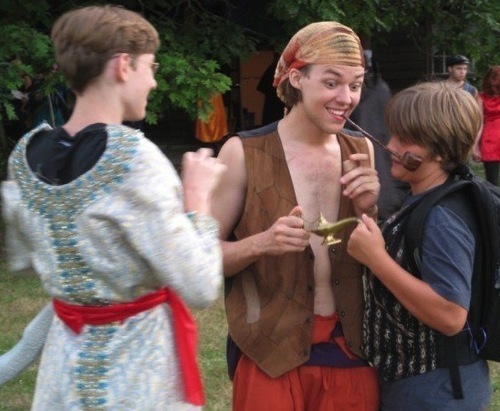
So what are my three tips for constructing interesting plots while letting your characters live and breathe?
1. Force them outside their comfort zones.
Characters are most entertaining when they’re challenged. This can be in little ways or big ways. If you’re dealing with a secret agent superspy, how do they react to having to take care of their aging parents? Push your characters to places they don’t expect to go, and see what happens.
2. Create interesting interactions.
Take the two characters in your story with the least in common. Put them face to face. Watch the sparks fly! A good Flow pushes characters together in strange combinations to see how they interact. Maybe they’ll suddenly become best friends. Maybe they’ll get in a fistfight. Maybe they’ll realize they actually have the solutions to each others’ problems, and collaborate on a sweet new Mars-lander rocket crane.
3. Go with the flow!
Sometimes characters have other ideas about where to go than what you had in mind. Move with their direction! Set up situations. Set up concepts. But let your characters do what they want. If you’ve given them complex and driving motivations, they’ll drive your story as they live in your world.
That’s it for my series on LARP-writing, and what it can teach anyone constructing stories! I hope you’ve enjoyed them.
If all of this sounds like fun to you, come play with us sometime, either in Berkeley or New York! Or look up your local LARPing group—there’s probably something somewhere nearby.
Good adventuring, campers! Good luck!
— Ben
August 14, 2012
A favorite, you say? How outré!

A few months ago, I was in a serious reading rut. As it happens, the book that got me out of that rut was a police procedural: Kate Atkinson’s Started Early, Took My Dog. And I haven’t stopped reading that genre since.
I have never been a person with a favorite type of book—or movie, or food, or place either. I am more of an “appreciate things for its own merits and my perspective-at-the-time person.” What some might label noncommittal.
But it “favorite” is defined as being the thing, or type of thing, that brings you the most joy, by golly, I think police procedurals are my favorite genre of book. I have never said that about any other genre in my life. (Well, okay, since the time I said that the Berenstain Bears books were my favorite.)
I always knew I liked this genre. I took detective fiction as part of my comparative literature focus in college, and loved learning about the theory of this writing style. I’ve read all of Sue Grafton’s Kinsey Millhone mysteries. I got especially enthusiastic about the literary category after reading Wrimo and award-winning novelist Elizabeth Haynes’s books. To me, her novels represent the best the genre has to offer. But it took reading many good examples of these novels back to back for me to really start to take notice of why I enjoy them so much.
The confluence of methodical plot progression, ratcheting tension and strategically placed thrills, dispensation of clues and details that make you think, and the ever-present sense of titillating uncertainty makes these books so danged satisfying for me. I appreciate the skill required of the writer to craft an effective police procedural: they have to keep you interested and informed just enough that the reader doesn’t feel duped, and allow you to start to develop your own hunches about how the crime might have gone down.
Often, police procedurals are serial novels centered around a quirky/enigmatic/troubled detective that appears throughout. What skill, to maintain the delicate character and plot requirements of the genre in tandem!
Yes, indeedy. I am hooked and ready for more. If you read this genre, what’s the latest read you’d recommend? And do you have a favorite genre?
-Lindsey
Image by Flickr user Vectorportal
August 10, 2012
Dear Pep Talk Author: Taming Dragons, Writing Novels, and Other Foolish Endeavors
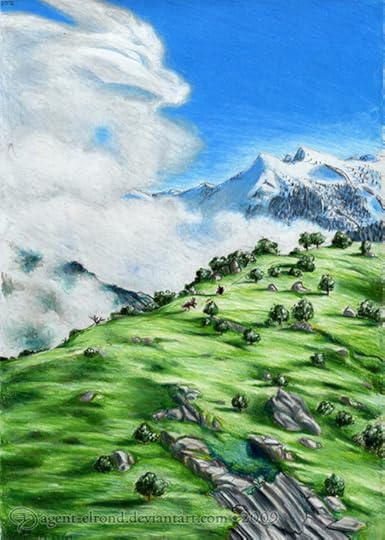
Dear Writer,
Consider the first card of the Tarot deck, titled The Fool. There’s this young man traipsing along with a small dog at his heel, carrying a flower in his other hand, gazing raptly at the sky—and about to step off a cliff, because he isn’t watching his feet. A fool indeed. Does this feel familiar? You’re doing much the same thing. What made you ever think you could bat out a bad book like that, let alone write anything readable?
Sigh. You’re a lost soul. So there’s no help for it but to join the lowly company of the other aspect of The Fool. Because the fact is, that Fool is a Dreamer, and it is Dreamers who ultimately make life worthwhile for the unimaginative rest of us. Dreamers consider the wider universe. Dreamers build cathedrals, shape fine sculptures, and yes, generate literature. Dreamers are the artists who provide our rapacious species with some faint evidence of nobility.
- Piers Anthony, NaNoWriMo Pep
Dear Piers,
I’m wracking my brain trying to think of the last time I was labeled a fool. I’ve called myself a dummy for one thing or another a handful of times in the last few days, but that’s not quite the same thing.
Have you seen How to Train Your Dragon? It’s a sneakily great movie, and one of my favorite scenes is between Hiccup, the hero, and his dad:
Gobber: If you ever want to get out there and fight dragons, you need to stop…all this.
Hiccup: But you just pointed to all of me!
That’s generally how we affix labels to people, though, you know? My first instinct isn’t to see the gradients in people, to think, ‘oh, the waiter is really terrible at being patient with me today’. The waiter’s terrible, or he’s not. You’re a fool, or you’re not. You’re a writer, or you’re not.
Hiccup’s dad thinks he’s unable, full stop, and foolish to think otherwise. Hiccup’s hurt, of course, but there’s something in him that protests because he knows, too, that he may not have the physical fitness, or a natural fight instinct, but he’s got a brain, and compassion, and the ambition that will drive him, later, to try something no one has ever even thought to do before: to train a dragon.
I guess I’m protesting, gently, that I’m not a fool, full stop. I will admit there’s a little bit of a foolish dreamer in me. But for most of the year, I “give up on folly and focus on reality,” like you initially suggest. Why not allow myself four weeks to indulge in creating worlds, shaping lives, and carving out adventures; to dream that maybe, just maybe, someone’s putting love knots into my newspaper bag, just like you do.
Sure, I haven’t been published yet. I’ve yet to write a NaNo-novel draft that doesn’t make me cringe when I re-read it. But for four weeks at a time during the year, I’ll let people call me a fool for writing: sure enough that there are parts of me able; and ambitious enough to try the improbable feat of taming a novel.
With affection and admiration,
Tim
Read the full pep talk from Piers Anthony
Check out Piers Anthony’s site
@PiersAnthony
Art by DeviantArt user Agent-Elrond
Chris Baty's Blog
- Chris Baty's profile
- 63 followers



